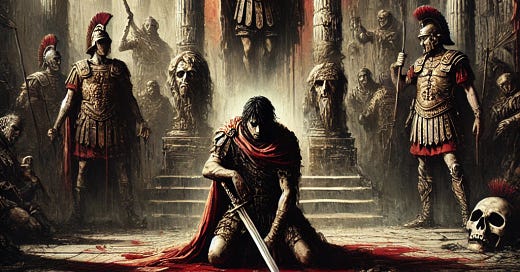Foreword by Gio Marron
The Tragedy of Titus Andronicus occupies a distinctive if polarizing, place in William Shakespeare's canon. As his earliest foray into tragedy, it is a work of unbridled intensity, brimming with violence, vengeance, and visceral emotional extremes. Its raw power and unapologetic depiction of human cruelty have provoked admiration, revulsion, and debate since its first performance in the late 16th century.
To approach Titus Andronicus is to confront Shakespeare at his most daring and experimental. Written during a time when revenge tragedies were highly popular, the play pushes the boundaries of theatrical conventions, delivering a shocking and thought-provoking spectacle. Its intricate plotting and relentless brutality invite audiences to reflect on the corrosive effects of revenge, the fragility of human morality, and the ease with which power can corrupt.
At its core, the play studies the cyclical nature of vengeance. The story’s central conflict—the collision of duty, honor, and personal vendetta—draws its characters into a web of escalating violence that ultimately destroys them. As a commentary on the excesses of human passion, the play's shocking moments compel readers and viewers to question the societal structures that encourage and perpetuate such acts.
The character of Titus himself is emblematic of the play’s layered complexity. A man of honor and loyalty, he becomes unmoored by grief and injustice, transforming into an agent of the chaos he once sought to quell. Similarly, the play’s antagonists, from Tamora’s cold resolve to Aaron’s malevolent cunning, reflect a spectrum of human desires and failings, challenging audiences to grapple with the multifaceted nature of villainy and heroism.
For centuries, critics dismissed Titus Andronicus as too sensational or lacking the refinement of Shakespeare’s later works. However, contemporary scholarship and performance have reevaluated its place in the Shakespearean oeuvre. Modern productions highlight its dark humor, commentary on political and social decay, and exploration of the theatrical potential of extreme emotion and action. In many ways, Titus Andronicus anticipates the themes and techniques that Shakespeare would refine in his later tragedies, making it an essential part of understanding his artistic evolution.
Titus Andronicus is not merely an artifact of its time but a work with enduring relevance. Its explorations of violence, justice, and human resilience resonate across centuries, reminding us of the timeless power of storytelling to confront the darkest corners of the human experience. Whether read as a historical curiosity, a bold experiment, or a timeless meditation on vengeance and loss, Titus Andronicus demands our attention and compels us to grapple with its unflinching vision of humanity.
Gio Marron
Video by LibroVox Audiobooks YouTube channel*
Narrated by:
Kelly S. Taylor: Narrator; Saturninus; Demetrius; First Goth; Second Tribune & Messenger.Craig Franklin: Titus Andronicus; Martius & Aemilius.
Sonia: Tamora; Young Lucius; Quintus; Third Goth; First Tribune & First Roman.
Tomas Peter: Aaron; Bassianus; Mutius; Clown; Fourth Goth & Second Roman.
Jenn Broda: Lucius; Lavinia; Publius & Nurse.
Brad “Hamlet” Filippone: Marcus Andronicus; Chiron; Captain & Second Goth.
*Not affiliated with The Elephant Island Chronicles.
Text courtesy of Project Gutenberg: The Tragedy of Titus Andronicus
Also available on AMAZON: The Tragedy of Titus Andronicus
Do you like what you read but aren’t yet ready or able to get a paid subscription? Then consider a one-time tip at:
https://www.venmo.com/u/TheCogitatingCeviche
Ko-fi.com/thecogitatingceviche







Gio, when I first read "Titus" I was so repulsed that I discarded it completely. Then I saw the film with Anthony Hopkins and thought it was a fair interpretation. It's still not Julius Caeser, but it holds a place in the canon.